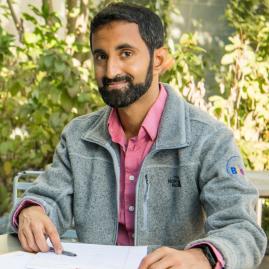
Aditya is from Houston, Texas, and interned for 5 summers with Shell and ExxonMobil as an undergraduate. His interest in biomolecular engineering was sparked by a desire to develop renewable liquid transportation fuel alternatives, and he remains excited to create new routes to chemicals from renewable sources using biocatalysis. During his post-doc, he became fascinated by the enormous potential of designer bacteria for biomedical applications. Whether for healthcare or sustainability goals, Aditya is most interested in taking functional group chemistries that are underrepresented in nature and designing routes to introduce them onto building block molecules. When outside of lab, Aditya enjoys CrossFit, building things in his woodshop, messing around on the alto sax, and playing board games.
In his laboratory at the University of Delaware, Dr. Kunjapur and his research group are designing innovative biomolecular technologies to address a variety of societal needs. He uses approaches from synthetic biology to investigate how microbes can use non-standard chemistry and unusual building blocks to generate products — including fuels, chemicals, materials, and therapeutics — that exhibit enhanced functionality.
The goal of his lab is to use synthetic biology approaches to investigate how microbes can create and harness building blocks that do not commonly appear in nature to generate products that exhibit enhanced functionality. Products of interest include therapeutics, vaccines, chemicals, and materials.
Some questions that interest us are: What are useful chemical functional groups that we impart upon small molecules or within proteins using enzymatic catalysis, metabolic engineering, and genetic code expansion technologies? Will small molecules that contain unusual functional groups be orthogonal to endogenous cellular processes, will they be consumed by the cell, and/or will they be toxic? Will cells transport these molecules across cell membranes? How could we engineer cells to overcome potential challenges with orthogonality, toxicity, or transport? Advancements in synthetic biology, genome engineering, genetic code expansion, and natural products discovery allow our lab to investigate where we can push the boundaries of what is possible.
Kunjapur earned his BS at the University of Texas at Austin and his PhD at the Massachusetts Institute of Technology, both in chemical engineering. He performed post-doctoral research in genetics at Harvard Medical School.
